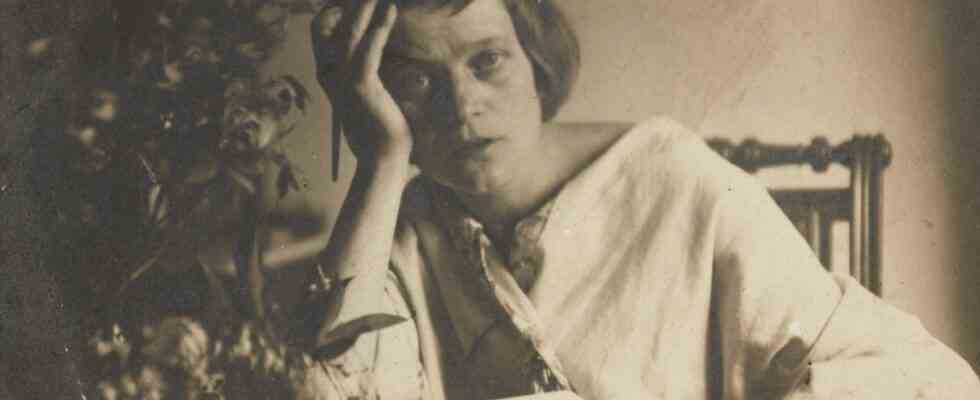She is often ill and almost always suffers from enormous financial difficulties. “And yet this bohemian artist’s life has been the best of my whole life up to now,” wrote Franziska zu Reventlow in 1893 to the writer and magazine editor Michael Georg Conrad. “At least it’s free, completely free and behind the scenes you can see far more truthfully, and you learn a lot of good things about people in times of need”.
“Live freely!” That was the most important thing for bohemian women more than a hundred years ago. An exhibition in Munich’s Monacensia is currently working on what dreams they had and what price they paid to realize them, focusing in particular on the writers Reventlow, Emmy Hennings and Margarete Beutler. An accompanying volume, recently published, takes up the most diverse aspects again, for example with a detailed contribution by the curator Laura Mokrohs – and supplements them with in-depth additional material as well as some shocking artist biographies.
Not only the correspondence between Reventlow and Conrad can be read in the volume “Frauen der Boheme”. In an article by Elena Zendler about the poet and silhouette artist Paula Rösler (1875-1941), for example, one learns how closely the adjectives “feminine, precarious, forgotten” belonged together among other bohemian women of the time – and what an inglorious role one of them played or other man played.
The financial fate of Paula Rösler, for example, was closely linked to that of the writer Waldemar Bonsels, and their relationship was characterized from beginning to end by “imbalance and dependency,” as Zendler points out. The Bohemian from Schwabing, who came from a wealthy family of manufacturers and was valued for her art and her own illustrated volumes of poetry such as “Falter” and “Fahana”, generously supported Bonsels, whom she admired, in the early days. That was well received: “It’s better to give than to take,” Bonsels noted sweetly in a notebook in 1908 under a photo of Paula Rösler. He himself preferred to take than to give: years later, when the artist, who now lives on Lake Chiemsee, got into trouble, the now highly successful inventor of the Maya the Bee repaid the money very hesitantly and only partially.
Bohemian women artists paid a higher price for freedom than men
“Women had to subordinate themselves and their needs to those of men,” concludes Zendler. Female bohemian artists “often endangered themselves much more because of their lifestyle” than their male colleagues, who “were able to reintegrate much more easily into bourgeois society”. For women, however, “changing love affairs mean a much greater stigma and illegitimate children also mean a financial burden”.
Initially kept her illegitimate children a secret: the writer Regina Ullmann, here in 1916 with her daughters Camilla (left) and Gerda.
(Photo: private / oh)
The life of the writer Regina Ullmann (1884-1961) offers a drastic example of the latter; Kristina Kargl rolled it out in an older essay that is still well worth reading. The Swiss-born author, not only highly valued by Rilke for works such as “Field Sermon”, moved to Munich around the turn of the century and became active in various Schwabing and women’s rights groups. When she became pregnant by a married TU professor in 1906, it was the “tragedy par excellence” for the young poet, as Kargl explains, but the child’s father left her to her fate. A little later, Ullmann met the psychoanalyst Otto Gross, who devoted himself to the topic of erotic rebellion and tried to heal “neuroses through sexual immorality”. According to Kargl, Regina Ullmann was treated by him “in various night sessions” – and soon became pregnant again.
One would almost like to shake one’s head in amusement if the child’s father hadn’t been quite indifferent to the consequences of his “therapy”, whereupon Ullmann at least filed a claim for maintenance, without concrete success. She now had two illegitimate children to take care of, placed them with foster parents in Styria – and tried to hide the births in Schwabing. Not everyone was as free and self-confident about her motherhood as Reventlow, who never disclosed her son’s father throughout her life – but one contribution in the volume suggests that it was the writer Jakob Leopold Windholz.
In any case, the writer Regina Ullmann drew the conclusion in her memoirs at the end of a life full of difficulties – as a Jew she later also had to flee from the National Socialists: “I took the detour instead of the way”. And this despite the fact that she believed “that a creative person can render no more important service to the world in which he works than to go the way and not the detour.”
Bohemian Women 1890-1920, ed. by Gabriele von Bassermann-Jordan, Waldemar Fromm, Wolfram Göbel and Kristina Kargl; Friends of Monacensia eV, Allitera Verlag, 284 pages, 24.90 euros.

